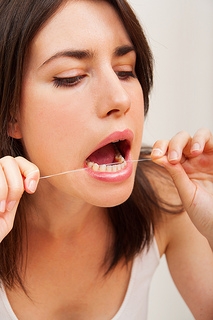September 23rd, 2020

Congratulations! You have made the decision to get orthodontic treatment at our Tustin office. Now it’s time to choose among your various appliance options. Traditional metal brackets and wires, lingual braces, a series of aligners—they all have positives to recommend them. And for some people, ceramic braces are the clear favorite.
Ceramic braces work like regular metal braces. Brackets are bonded to the front of each tooth, and rubber bands surrounding the brackets hold the arch wire that gradually moves the teeth into alignment.
Ceramic braces, however, use brackets made of clear or tooth-colored ceramic or porcelain which blend beautifully with the color of your tooth. The elastic ligatures, or rubber bands, can be chosen to match the brackets or your enamel. There are self-ligating ceramic brackets which don’t use bands at all. Technology is even working on ways to make the arch wire less visible! The end result is braces that are almost undetectable.
If you want a less obvious appliance for professional or personal reasons, talk to us about ceramic braces. As always, there are other factors to consider before you decide, which we will be happy to discuss with you.
- Ceramic brackets are very strong, but they are still more brittle than the metal model. If you play a contact sport, these might not be for you. (But whatever braces you choose, please wear a mouthguard when playing sports.)
- Ceramic braces might not be ideal depending on the amount of alignment and bite correction that is needed. They might also take a bit more time to bring your teeth into alignment. We will be able to tell you if ceramic braces will work for you and if they might require a longer period to move your teeth to their perfect position.
- Brackets can sometimes be somewhat larger (though this isn’t always the case), and, because they can be abrasive, are often recommended for upper teeth only. This way, the lower teeth will not impact, or be impacted by, contact with the upper teeth.
- Oral hygiene can trickier with ceramic braces. Although today’s brackets aren’t as prone to staining, you still need to be careful to brush away the plaque that can accumulate around the brackets. And the bands are susceptible to staining by the usual suspects—coffee, tea, colas, blueberries, or any strongly colored food or beverage.
- Costs will differ depending on the treatment method you choose. Talk to us about cost comparisons with other orthodontic treatments.
Ceramic braces, because they are so much less visible, are a popular orthodontic option, especially for older teenagers and adults. If you are interested, talk to Dr. Max Mosslehi about this effective way to straighten your teeth—discreetly. Ceramic might be the clear solution for creating your lasting, beautiful smile.
September 16th, 2020

Children are born with a set of primary teeth – 20 to be exact – that help them learn to chew and speak, and develop enough space in the jaw for the permanent teeth that will appear several years later. Kids are especially susceptible to decay, which can cause pain and tooth loss – a problem that could interfere with oral development. As a parent, it is important that you take proactive steps to keep your child’s teeth as healthy as possible.
Bottles and “Sippie Cups”
One of the biggest culprits of childhood tooth decay is poor diet. This begins as early as a few months old, when children are often allowed to go to bed with bottles and “sippie cups” of milk or juice. The sugars in these beverages – even natural sugars – can steadily decay the teeth.
Dr. Max Mosslehi and our staff suggest serving children milk and juice only at meal times, and limiting juice intake to just a few ounces per day. If your child becomes thirsty between meals or likes to go to bed with a bottle, serve water during these times.
Hygiene
As a parent, you can establish healthy dental habits long before your child’s first tooth erupts. Start by gently wiping your baby’s gums with a clean wash cloth during the first months of life. By age one, graduate to an appropriately sized toothbrush with fluoridated toothpaste, and brush at least twice a day.
Dental Visits
Dental visits should start young and continue on a regular basis throughout your child's life. Dr. Max Mosslehi and our staff recommend parents bring their children to Max Mosslehi, DMD, Inc. for the first time no later than the child’s first birthday. Initial visits concentrate on parental education, while later visits may include thorough cleanings and fluoride treatments as your child grows.
For more information about keeping your child’s teeth cavity-free, contact our Tustin office to schedule a dental consultation and checkup.
September 9th, 2020

Whether it’s a dull and throbbing ache or a sharp pain, toothaches can come in many different forms. Chances are you’ve had the discomforting experience once or twice in your life. It’s the type of experience that nobody wants to have, because a toothache can be as annoying as fingernails scratching a chalkboard.
What’s a good way to describe a toothache? Let’s see … your mouth feels as if it’s being besieged by one of those Loony Tunes-style jackhammers. As fate would have it, toothaches always seem to occur over the weekend or after-office hours, leaving you to suffer and forcing you to cancel your reservation at that high-end restaurant you’ve been anticipating all week.
Not so fast!
While you’re probably going to want to skip the rib-eye steak, there are numerous tried-and-true home remedies you can use to ease the pain until you can make an appointment with our office. Here’s a look at four ways to soothe a toothache.
- Don’t underestimate the power of salt water. Rinsing your mouth with warm salt water will both soothe your toothache and disinfect your mouth. However, make sure the water is warm; cold water can further exacerbate a sensitive tooth. Follow up the saltwater rinse by swishing your mouth with hydrogen peroxide.
- Clove oil, eucalyptus oil, peppermint oil, and vanilla extract are proven to be comforting elixirs. Dip a cotton swab in one of these mixtures and apply it to your tooth and gums. These substances, which you may even have in your kitchen cupboards, are known to have pain-relieving qualities. For the best results, repeat the application throughout the day.
- Eating yogurt is good for toothaches and mouth pain. Yogurt is filled with healthy bacteria that combat pain. Afterward, place a cold compress on your jaw.
- Try flossing. Your toothache might be throbbing and severe, but there’s always a chance the pain is caused by a piece of food awkwardly lodged in your teeth.
We hope that helps! Give Max Mosslehi, DMD, Inc. a call to learn more!
August 26th, 2020

Crooked teeth, more correctly called malocclusions, have reached epidemic proportions in the late 20th and early 21st centuries. According to the American Association of Orthodontists, approximately 80 percent of American teenagers are currently undergoing orthodontic treatment. Although advances in orthodontic devices and increased availability of such devices explain part of this increase, it still means there are a lot of crooked teeth in the world.
The theories about what is causing so many crooked teeth range from the ridiculous to the scientific. For years, oral health professionals believed that crooked teeth were an evolutionary result of the change in Western diets from raw, wild foods to soft, processed foods. That theory has since been debunked.
The truth is that crooked teeth can be caused by a number of things. Crooked teeth can be an inherited trait. Parents with crooked teeth and malformed jaws are more likely to have children with malocclusions. Ill-fitting or poorly-executed dental restorations, such as fillings and crowns, can also cause teeth to become crooked. Baby teeth that fall out early, gingivitis, and even a jaw that is too small to accommodate all of a person’s adult teeth are additional causes of crooked teeth. In addition, thumb sucking and the use of a pacifier for too long can contribute to crooked teeth.
What to do about crooked teeth
Fortunately, modern orthodontics offers a number of solutions for crooked teeth. Traditional metal braces are the most popular, though our Tustin office provides a number of clear, aesthetic options as well. If you’re tired of hiding your smile because of crooked teeth, contact Dr. Max Mosslehi and our team at Max Mosslehi, DMD, Inc. and set up an appointment. We’ll have you showing off your straight pearly whites in no time!












 Website Powered by Sesame 24-7™
Website Powered by Sesame 24-7™